| 22 June |
• yesterday • tomorrow |
| Optional Memorial of Saint Paulinus of Nola, Bishop; Optional Memorial of Saint John Fisher, Bishop and Martyr; Optional Memorial of Saint Thomas More, Martyr |
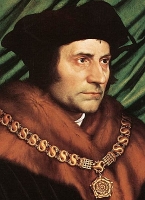
omnium horarum homo (a man for all seasons, referring to his wide scholarship and knowledge)
1 December as one of the Martyrs of Oxford University
Studied at London and Oxford, England. Page for the Archbishop of Canterbury. Lawyer. Twice married, and a widower he was the father of one son and three daughters, and a devoted family man. Writer, most famously of the novel which coined the word Utopia. Translated with works of Lucian. Known during his own day for his scholarship and the depth of his knowledge. Friend of King Henry VIII. Lord Chancellor of England from 1529 to 1532, a position of political power second only to the king. Fought any form of heresy, especially the incursion of Protestantism into England. Opposed the king on the matter of royal divorce, and refused to swear the Oath of Supremacy which declared the king the head of the Church in England. Resigned the Chancellorship, and was imprisoned in the Tower of London. Martyred for his refusal to bend his religious beliefs to the king's political needs.
7 February 1478 at London, England
• beheaded on 6 July 1535 on Tower Hill, London, England
• body taken to Saint Peter ad Vincula, Tower of London, England
• his head was parboiled and then exposed on London Bridge for a month as a warning to other "traitors"; Margaret Roper bribed the man whose was supposed to throw it into the river to give it to her instead
• in 1824 a lead box was found in the Roper vault at Saint Dunstan's Church Canterbury, England; it contained a head presumed to be More's
1886 by Pope Leo XIII
1935 by Pope Pius XI
• adopted children
• civil servants
• court clerks
• difficult marriages
• large families
• lawyers
• politicians (given in 2000 by Pope John Paul II)
• step-parents
• widowers
• diocese of Arlington, Virginia
• diocese of Pensacola-Tallahassee, Florida
• Ateneo de Manila Law School
• Society of Our Lady of Good Counsel
• University of Malta
• University of Santo Tomas Faculty of Arts and Letters
• axe
• English Lord Chancellor carrying a book
• English Lord Chancellor carrying an axe
What does it avail to know that there is a God, which you not only believe by Faith, but also know by reason: what does it avail that you know Him if you think little of Him? - Saint Thomas More
What men call fame is, after all, but a very windy thing. A man things that many are praising him, and talking of him alone, and yet they spend but a very small part of the day thinking of him, being occupied with things of their own. - Saint Thomas More
Although I know well, Margaret, that because of my past wickedness I deserve to be abandoned by God, I cannot but trust in his merciful goodness. His grace has strengthened me until now and made me content to lose goods, land, and life as well, rather than to swear against my conscience. God's grace has given the king a gracious frame of mind toward me, so that as yet he has taken from me nothing but my liberty. In doing this His Majesty has done me such great good with respect to spiritual profit that I trust that among all the great benefits he has heaped so abundantly upon me I count my imprisonment the very greatest. I cannot, therefore, mistrust the grace of God. By the merits of his bitter passion joined to mine and far surpassing in merit for me all that I can suffer myself, his bounteous goodness shall release me from the pains of purgatory and shall increase my reward in heaven besides. I will not mistrust him, Meg, though I shall feel myself weakening and on the verge of being overcome with fear. I shall remember how Saint Peter at a blast of wind began to sink because of his lack of faith, and I shall do as he did: call upon Christ and pray to him for help. And then I trust he shall place his holy hand on me and in the stormy seas hold me up from drowning. And finally, Margaret, I know this well: that without my fault he will not let me be lost. I shall, therefore, with good hope commit myself wholly to him. And if he permits me to perish for my faults, then I shall serve as praise for his justice. But in good faith, Meg, I trust that his tender pity shall keep my poor soul safe and make me commend his mercy. And, therefore, my own good daughter, do not let you mind be troubled over anything that shall happen to me in this world. Nothing can come but what God wills. And I am very sure that whatever that be, however bad it may seem, it shall indeed be the best. - from a letter written by Saint Thomas More from prison to his daughter Margaret
Grant me, O Lord, good digestion, and also something to digest. Grant me a healthy body, and the necessary good humor to maintain it. Grant me a simple soul that knows to treasure all that is good and that doesn't frighten easily at the sight of evil, but rather finds the means to put things back in their place. Give me a soul that knows not boredom, grumblings, sighs and laments, nor excess of stress, because of that obstructing thing called "I". Grant me, O Lord, a sense of good humor. Allow me the grace to be able to take a joke to discover in life a bit of joy, and to be able to share it with others. Amen. - Saint Thomas More
https://catholicsaints.info/saint-thomas-more/
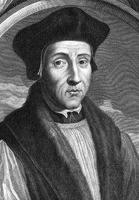
• John of Rochester
• John Fisher of Rochester
Studied theology at Cambridge University, receiving degrees in 1487 and 1491. Parish priest in Northallerton, England from 1491 to 1494. Gained a reputation for his teaching abilities. Proctor of Cambridge University. Confessor to Margaret Beaufort, mother of King Henry VII, in 1497. Bishop of Rochester, England in 1504; he worked to raise the standard of preaching in his see. Chancellor of Cambridge. Tutor of the young King Henry VIII. Excellent speaker and writer. When in 1527 he was asked to study the problem of Henry's marriage, he became the target of Henry's wrath when John defending the validity of the marriage and rejecting Henry's claim to be head of the Church in England. Imprisoned in 1534 for his opposition, he spent 14 months in prison without trial. While in prison he was created cardinal in 1535 by Pope Paul III. Martyr.
1469 at Beverly, Yorkshire, England
• 22 June 1535 on Tower Hill, Tyburn, London, England
• buried in the churchyard of All Hallows, Barking, England without rites or a shroud
• head exhibited on London Bridge for two weeks as an example, then thrown into the River Thames
• relics in Saint Peter's Church in the Tower of London
29 December 1886 by Pope Leo XIII
1935 by Pope Pius XI
diocese of Rochester, New York
• cardinal with an axe nearby
• cardinal with his hat at his feet
• cardinal with worn, haggard features
Had you but tasted one drop of the sweetness which inebriates the souls of those religious from their worship of this Sacrament, you would never have written as you have, nor have apostatized from the faith that you formerly professed. - Saint John Fisher, writing to the bishop of Winchester, England
I reckon in this realm no one man, in wisdom, learning, and long approved virtue together, meet to be matched and compared with him. - Saint Thomas More
https://catholicsaints.info/saint-john-fisher/
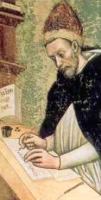
• Doctor famosissimus
• Petrus a Tarentasia
Joined the Dominicans at age 16. Studied at the University of Paris, receiving a master in sacred theology in 1250. He was famous in his life as a preacher and theologian. Archbishop of Lyons, France in 1272. Wrote several works on philosophy, theology, and canon law. Played a prominent part in the Council of Lyons, working for the union of the Greeks with Rome. Cardinal-bishop of Ostia in 1273. Part of the Second Ecumenical Council of Lyons in 1274. Gave the funeral oration for Saint Bonaventure. His papacy lasted less than a year. Worked for peace between the Guelphs and the Ghibellines, the Italian cities of Pisa and Lucca, Rudolph of Habsburg and Charles of Anjou.
c.1225 at Tarentaise, Burgundy, France as Petrus a Tarentasia
elected 21 January 1276 at Arezzo, Italy
22 June 1276 at Rome, Italy of natural causes
1898 by Pope Leo XIII
God of truth, you bestowed on Blessed Innocent the gifts of knowledge and prudence and made him a promoter of peace and unity. By the help of his prayers may we cherish what is of heaven and in perfect unity follow what is right. We ask this through our Lord Jesus Christ, your Son, who lives and reigns with you and the Holy Spirit, one God, for ever and ever. - General Calendar of the Order of Preachers
https://catholicsaints.info/pope-blessed-innocent-v/
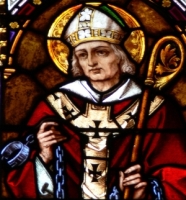
Meropius Pontius Anicius Paulinus
Friend of Saint Augustine of Hippo and Saint Nicetas of Remesiana, and mentioned for his holiness by at least six of his contemporary saints.
Distinguished lawyer. Held several public offices in the Empire, then retired from public ministry with his wife, Therasia, first to Bordeaux, France where they were baptized, and then to Therasia's estate in Spain. After the death of their only son at the age of only a few weeks, the couple decided to spend the rest of their lives devoted to God. They gave away most of their estates and dedicated themselves to increasing their holiness.
Paulinus was ordained, then he and Therasia moved to Nola, Italy, gave away the rest of their property, and dedicated themselves to helping the poor. Paulinus was chosen bishop of Nola by popular demand, and he governed the diocese for more than 21 years while living in his own home as a monk and continuing to aid the poor. His writings contain one of the earliest examples of a Christian wedding song.
c.354 at Burdigala, Gaul (modern Bordeaux, France)
22 June 431 of natural causes
• bishop giving alms to the poor
• bishop holding chains
• bishop holding manacles
https://catholicsaints.info/saint-paulinus-of-nola/
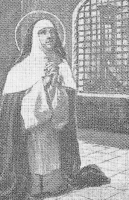
Sister Saint Monica
21 January as one of the Martyrs of Laval
She had no education or place in the world when she was orphaned as a small girl. She worked briefly as a domestic servant then applied for entry to the Augustinian Sisters of the Mercy of Jesus (French Federation) at the convent of San Giuliano. She worked at the hospital of Chateau Gontier, and made her profession in 1778, taking the name Sister Maria of Santa Monica. Martyred in the French Revolution for refusing to take the civil oath.
18 November 1744 in Arquenay, Mayenne, France
beheaded on 25 June 1794 in Laval, Mayenne, France
19 June 1955 by Pope Pius XII at Rome, Italy
https://catholicsaints.info/blessed-marie-lhuilier/
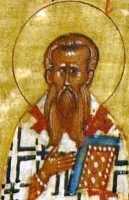
Bishop of Samosata, Syria. Fought Arianism, and defended Orthodox Christianity in the 4th century. Active in the Synod of Antioch in 361, a site of great debate over Arianism. Emperor Constantius was displeased, and demanded that Eusebius turn over records from the synod, threatening to amputate the bishop's hand if he refused; he refused; Constantius was impressed, and let him go.
Worked with Christians in Syria and Palestine, encouraging their faith during the persecutions of Valens. This work got him exiled to Thrace, but when Valens died in 378, Eusebius returned to Samosata. Killed by an Arian woman when he went to Dolikha, Syria to ordain a Catholic bishop.
hit with a thrown roof tile at Dolikha, Syria in 379
https://catholicsaints.info/saint-eusebius-of-samosata/
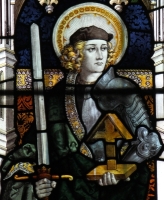
• Alban of Verulam
• Proto-Martyr of Britain
• Albano, Auban, Aubin, Albain, Albane, Albans, Albe
Soldier in the imperial Roman army of Diocletian. Convert, brought to the faith by Saint Amphibalus of Verulam whom he had sheltered. The first martyr in Britain, dying in the persecutions of Diocletian.
c.303 at Verulam (Verulamium) (modern Saint Albans, England)
• with a cross in one hand and a sword in the other, with a river or spring in the foreground
• fountain
• sword
• head in his hand
• converts
• torture victims
• Riva presso Chieri, Italy
https://catholicsaints.info/saint-alban-of-britain/

• Ebergard of Salzburg
• Everard of Salzburg
Born to the nobility. Studied at the Benedictine school at Bamberg, Bavaria. Priest. Canon of the Cathedral of Bamberg. Studied in Paris, France, earning a master's degree. Benedictine monk at Prufening Abbey, Regensburg, Germany in 1125. Abbot at Biburg, Germany, a house that had been established by his siblings. Archbishop of Salzburg in 1146. Noted as a reformer of his clergy, and a peacemaker in his diocese. Supported Pope Alexander III against the anti-pope Victor IV.
1085 at Nuremberg, Germany
22 June 1164 at the Cistercian monastery of Rein, Austria of natural causes
https://catholicsaints.info/saint-eberhard-of-salzburg/
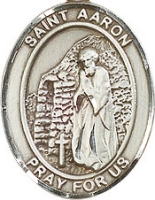
• Aaron of Aleth
• Aihran...
Migrated to Cesambre, a small island near Aleth in Armorica, Brittany (in modern France) to live as a hermit; the island was accessible only at low tide, and for centuries was known as Aaron in his honour. His reputation attracted spiritual students, including Saint Malo. The students formed a monastery, and Aaron lived there as a monk, and served as their abbot.
Wales
c.552
https://catholicsaints.info/saint-aaron-of-brettany/

Aprincia, Prec, Prèce, Preci, Précie
Daughter of Saint Goeric; great-niece of Saint Arnulf of Metz. She and her sister Victorina became nuns. First abbess of a monastery in Epinal, Gaul (near the Moselle River in modern France).
late 6th century Gaul
• 7th century of natural causes
• relics enshrined at the church of Saint Clement in Metz, France
https://catholicsaints.info/saint-precia-of-epinal/
Hesperus, Spera, Spère, Spero, Speros, Sperus, Spire
28 October as one of the Holy Bishops of Metz
Bishop of Metz, France from 525 to 542. Presided at the funeral of Saint Theodoric of Mont d'Or in 533. Attended the Synod of Clermont in 535. Friend of Saint Lupus of Soissons.
late 5th century
c.548 of natural causes
https://catholicsaints.info/saint-hesperius-of-metz/
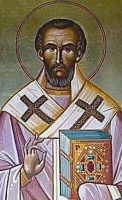
Friend of Saint Paulinus of Nola. Missionary bishop in Decia (modern Romania and Yugoslavia). Author of several theological works. Credited by many scholars with writing the great hymn, Te Deum.
early 5th century Remesiana (modern Bela Palanka, Serbia)
Romania
https://catholicsaints.info/saint-nicetas-of-remesiana/
Born into the nobility. Miraculously healed the dying daughter of King Clotaire. In reward, the king endowed a convent in an area of modern France, and Consotia fled there to escape a series of marriage proposals and life the religious life. Venerated at Cluny, France.
c.570 of natural causes
https://catholicsaints.info/saint-consortia/
Esuperanzio
Sixth bishop of Como, Italy c.495. Ardent opponent of Arianism.
c.400 in Greece
• c.512 of natural causes
• buried in the church of Sant'Abbondio in Como, Italy
https://catholicsaints.info/saint-exuperantius-of-como/
Brother of the Emperor Vespasian, uncle of Emperor Titus and Emperor Domitian. Married to Domitian's niece, Flavia Domitilla. Imperial consul with Domitian in 95. Martyred within a year for being a Christian.
beheaded in 96
https://catholicsaints.info/saint-flavius-clemens/
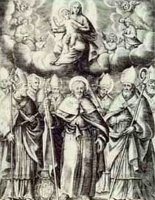
Martyred in the persecutions of Valerian.
relics enshrined in Sicily
https://catholicsaints.info/saint-gregory-of-agrigento/
• Giovanni d'Acquarola
• John the Peacemaker
Bishop of Naples, Italy.
835 of natural causes
Naples, Italy
https://catholicsaints.info/saint-john-iv-of-naples/
1480 Christians massacred in and near Samaria during the war between the Greek Emperor Heraclius and the pagan Chosroas of Persia.
c.614 in the vicinity of Samaria, Palestine
https://catholicsaints.info/martyrs-of-samaria/
No information has survived.
• c.869
• relics enshrined in the church of Saint Bertin, Saint Omer, France
https://catholicsaints.info/saint-rotrudis-of-saint-omer/
Martyred with Saint Alban in the persecutions of Diocletian.
c.303 in Verulamium, Hertfordshire, England
https://catholicsaints.info/saint-heraclius-the-soldier/
Martyred with in the persecutions of Diocletian.
c.303 at Pais-de-Leon, Brittany (in modern France
https://catholicsaints.info/saint-julius-of-pais-de-laon/
Martyred with in the persecutions of Diocletian.
c.303 at Pais-de-Leon, Brittany (in modern France
https://catholicsaints.info/saint-aaron-of-pais-de-laon/
Mochua
Monk. Abbot of Ferns in the latter 7th-century.
late 7th century
https://catholicsaints.info/saint-cronan-of-ferns/
15th century nun in Hamm, Westphalia (in modern Germany). Stigmatist, attested by 12 witnesses.
https://catholicsaints.info/blessed-kristina-hamm/
Franciscan tertiary known for her piety.
c.1280 at Rome, Italy
https://catholicsaints.info/blessed-altrude-of-rome/
Martyr.
Alexandria, Egypt, date unknown
https://catholicsaints.info/saint-rufinus-of-alexandria/
• Madonna Ta' Pinu
• Our Lady of the Cape
• Alban of Riva
• Crunmael of Barragh
• Jean de la Belliere
• Nicetas of Aquileia
CatholicSaints.Info Portable Edition